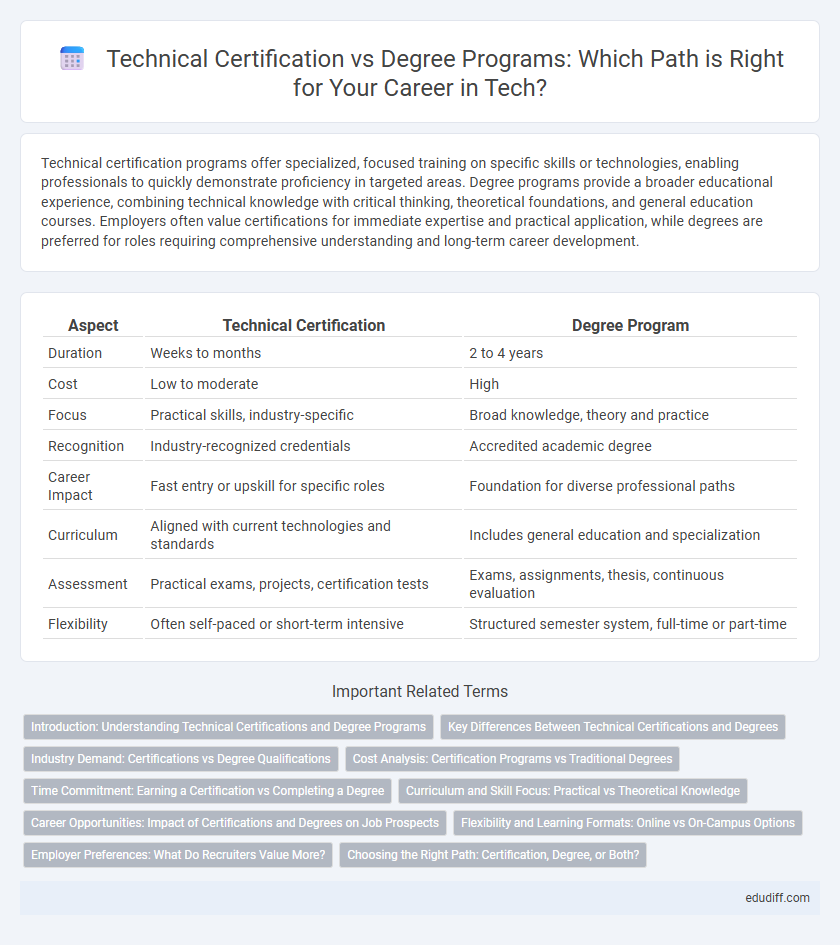Technical certification programs offer specialized, focused training on specific skills or technologies, enabling professionals to quickly demonstrate proficiency in targeted areas. Degree programs provide a broader educational experience, combining technical knowledge with critical thinking, theoretical foundations, and general education courses. Employers often value certifications for immediate expertise and practical application, while degrees are preferred for roles requiring comprehensive understanding and long-term career development.
Table of Comparison
| Aspect | Technical Certification | Degree Program |
|---|---|---|
| Duration | Weeks to months | 2 to 4 years |
| Cost | Low to moderate | High |
| Focus | Practical skills, industry-specific | Broad knowledge, theory and practice |
| Recognition | Industry-recognized credentials | Accredited academic degree |
| Career Impact | Fast entry or upskill for specific roles | Foundation for diverse professional paths |
| Curriculum | Aligned with current technologies and standards | Includes general education and specialization |
| Assessment | Practical exams, projects, certification tests | Exams, assignments, thesis, continuous evaluation |
| Flexibility | Often self-paced or short-term intensive | Structured semester system, full-time or part-time |
Introduction: Understanding Technical Certifications and Degree Programs
Technical certifications validate specific skills and competencies through focused assessments, often reflecting current industry standards and technologies. Degree programs offer comprehensive education across broader theoretical and practical knowledge areas, typically spanning several years. Employers value certifications for immediate job readiness and degrees for foundational expertise and career development.
Key Differences Between Technical Certifications and Degrees
Technical certifications emphasize specialized skills and practical knowledge, offering targeted expertise in specific technologies or methodologies, while degree programs provide a comprehensive education with theoretical foundations and broader interdisciplinary study. Certifications typically require less time and financial investment, enabling faster entry into the workforce or skill updating compared to multi-year degree programs. Employers often value certifications for immediate job readiness, whereas degrees are associated with long-term career development and academic achievement.
Industry Demand: Certifications vs Degree Qualifications
Industry demand increasingly favors technical certifications for specialized skills such as cloud computing, cybersecurity, and data analysis due to their targeted curriculum and faster completion times. Degree programs provide broader theoretical foundations but often take longer to complete, making certifications more attractive to employers seeking immediate expertise in rapidly evolving technology sectors. Certifications from recognized bodies like CompTIA, Cisco, and AWS directly align with current industry standards and job requirements, enhancing employability in technical roles.
Cost Analysis: Certification Programs vs Traditional Degrees
Certification programs typically cost significantly less than traditional degree programs, with average fees ranging from $1,000 to $4,000 compared to $20,000 to $50,000 for a bachelor's degree. The shorter duration and targeted curriculum of certification courses reduce both direct educational expenses and opportunity costs related to time away from the workforce. Employers often value certifications for specific technical skills, making cost-effective certification programs an attractive alternative for career advancement in IT, engineering, and other technical fields.
Time Commitment: Earning a Certification vs Completing a Degree
Technical certifications typically require weeks to months to complete, providing targeted skills and faster entry into the workforce. Degree programs demand multiple years of study, encompassing broad theoretical knowledge and comprehensive coursework. The shorter time commitment of certifications suits professionals seeking rapid skill acquisition, while degrees offer in-depth education for long-term career development.
Curriculum and Skill Focus: Practical vs Theoretical Knowledge
Technical certification programs emphasize practical skills through hands-on training and specialized coursework tailored to specific job roles, ensuring immediate applicability in the workforce. Degree programs offer a broad theoretical foundation across multiple disciplines, fostering analytical thinking and comprehensive understanding of underlying principles. Employers often seek certification for job readiness and degrees for advanced problem-solving capabilities and adaptability.
Career Opportunities: Impact of Certifications and Degrees on Job Prospects
Technical certifications often provide specialized skills that align directly with industry requirements, enhancing immediate employability and demonstrating proficiency in specific tools or technologies. Degree programs offer a broader educational foundation and critical thinking skills that appeal to employers seeking candidates for long-term career growth and leadership roles. Combining certifications with a degree can significantly improve job prospects by validating both practical expertise and comprehensive knowledge.
Flexibility and Learning Formats: Online vs On-Campus Options
Technical certifications offer greater flexibility with self-paced online courses and short-term programs tailored to specific skills, making them ideal for professionals seeking quick upskilling. Degree programs typically require structured on-campus attendance or fixed online schedules, providing comprehensive theoretical knowledge but less adaptability for working individuals. Online technical certification courses often incorporate interactive modules and real-world projects, whereas degree programs emphasize in-depth study and research through synchronous learning environments.
Employer Preferences: What Do Recruiters Value More?
Employers increasingly prioritize technical certifications for their demonstration of up-to-date, specialized skills and practical expertise directly applicable to job roles. Degree programs offer comprehensive theoretical knowledge and critical thinking abilities valued in long-term career growth and leadership potential. Recruiters often seek a balanced combination, but certifications can provide faster, targeted proof of competency in rapidly evolving technical fields.
Choosing the Right Path: Certification, Degree, or Both?
Technical certifications offer targeted skills and faster entry into specialized fields, ideal for professionals seeking immediate expertise in areas like cybersecurity or cloud computing. Degree programs provide comprehensive theoretical knowledge and critical thinking development, essential for roles requiring broader academic foundations such as software engineering or systems architecture. Combining certifications with a degree enhances credibility, practical skills, and career flexibility, making candidates more competitive in rapidly evolving tech industries.
Technical Certification vs Degree Program Infographic

 edudiff.com
edudiff.com